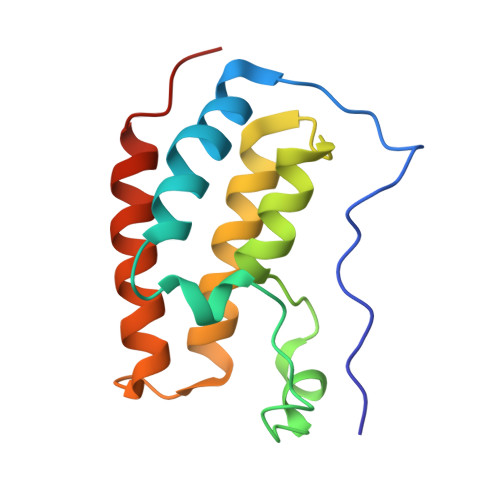Design and Characterization of Novel Covalent Bromodomain and Extra-Terminal Domain (BET) Inhibitors Targeting a Methionine.
Kharenko, O.A., Patel, R.G., Brown, S.D., Calosing, C., White, A., Lakshminarasimhan, D., Suto, R.K., Duffy, B.C., Kitchen, D.B., McLure, K.G., Hansen, H.C., van der Horst, E.H., Young, P.R.(2018) J Med Chem 61: 8202-8211
- PubMed: 30165024
- DOI: https://doi.org/10.1021/acs.jmedchem.8b00666
- Primary Citation of Related Structures:
6CZU, 6CZV - PubMed Abstract:
BET proteins are key epigenetic regulators that regulate transcription through binding to acetylated lysine (AcLys) residues of histones and transcription factors through bromodomains (BDs). The disruption of this interaction with small molecule bromodomain inhibitors is a promising approach to treat various diseases including cancer, autoimmune and cardiovascular diseases. Covalent inhibitors can potentially offer a more durable target inhibition leading to improved in vivo pharmacology. Here we describe the design of covalent inhibitors of BRD4(BD1) that target a methionine in the binding pocket by attaching an epoxide warhead to a suitably oriented noncovalent inhibitor. Using thermal denaturation, MALDI-TOF mass spectrometry, and an X-ray crystal structure, we demonstrate that these inhibitors selectively form a covalent bond with Met149 in BRD4(BD1) but not other bromodomains and provide durable transcriptional and antiproliferative activity in cell based assays. Covalent targeting of methionine offers a novel approach to drug discovery for BET proteins and other targets.
Organizational Affiliation:
Zenith Epigenetics , Suite 300, 4820 Richard Road SW , Calgary , Alberta T3E 6L1 , Canada.
















